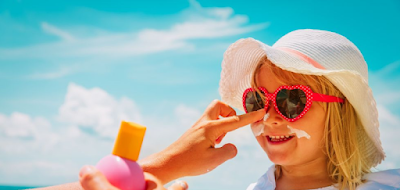Babies are so cute, right? Well, their skin is even cuter. Babies have a lot of skin folds that are sometimes not so pretty to look at. This can cause problems with their skin and lead to infection! So we need to make sure that our baby's skin gets a little extra TLC.
You see, sometimes babies don't get enough sleep and they tend to get cranky when they wake up from naps (like ours). When this happens, the crying can rub against the folds in their face causing irritation and swelling around these folds. Let's find out how you can improve baby skin with 10 easy tips.
1: Breastfeeding
Breastfeeding can have a huge impact on your baby's skin. Breast milk contains a variety of nutrients that are essential for your baby's growth and development. Some of these nutrients may be deficient in breastfed babies, which leads to dry skin.
Breastfed babies also have less contact with bacteria and viruses than formula-fed babies. This means that they are less likely to develop eczema or other rashes. Breastfeeding is also associated with lower levels of allergies, which can help prevent asthma attacks in children
Breastfeeding is also linked with less eczema in toddlers and preschoolers. Children who are breastfed by their mothers at the time they start solid foods are more likely to be breastfed longer than non-breastfed children.
2: Reducing time in a diaper
The first thing to do is to reduce time in diapers. This will help you avoid diaper rash and also prevent your baby’s skin from getting dry and itchy.
You should change your baby’s diapers often and wash them twice a day. This will help minimize the risk of diaper rash. You can also use baby powder after every diaper change to keep their skin dry and soft.
You can also apply coconut oil on your baby’s skin as it has natural anti-bacterial properties that help treat diaper rash as well as other skin conditions.
3: Use of mineral oils
Mineral oils are used on babies’ skin. These oils have been proven to be safe and effective as they have no side effects. This oil can be applied to the face, back, scalp, and body to help prevent dryness. Mineral oil is also suitable for use on babies because it does not clog pores or cause any skin irritation.
4: Moisturize baby skin
Moisturize your baby's skin with a good-quality moisturizer. Choose one that contains sunscreen, because the sun is a major cause of premature aging and wrinkling.
Use a lotion or cream instead of a lotion bar on your baby's face. Creams work better than lotion bars because they don't dry out the skin as lotion bars do.
If you use a lotion bar on your baby's face, make sure you put it on before bedtime so it doesn't get warm when you're sleeping.
Don't use petroleum jelly as a moisturizer for your baby's face. Petroleum jelly can lead to an allergic reaction in babies, which causes redness and irritation on the skin.
5: Use of herbal care for baby skin
Herbal care for baby skin is one of the best ways to improve your baby's complexion. Herbs are nature's gift and they have been used for centuries to treat various ailments.
The use of herbal care for baby skin can be done at home or during the hospital stay.
It's very easy to use herbs to improve the complexion of your baby. The following are some tips on how you can do it:
Herbs can be used in a variety of ways, from massaging them onto the baby's skin to using them as a bath or to drink. The most common herbs used for skin disorders are:
Aloe Vera – Aloe vera gel has antibacterial properties that help heal cuts and cuts on babies' faces because it will not dry out their skin;
Calendula Ointment – Calendula ointment contains vitamin A and E, which helps heal bruises and rashes on the face;
Eucalyptus Oil – Eucalyptus oil has anti-inflammatory properties that help reduce swelling in the body;
Ginger Root Tea – Ginger root tea has anti-inflammatory properties that help reduce swelling in the body;
Rose Hip Seed Oil – Rosehip seed oil
6: opt for cotton clothes
Cotton clothes are the best for your baby’s skin. Cotton is a great fabric because it breathes and keeps your baby cool, while also allowing them to sweat and stay dry when they get hot. This means that you don’t have to worry about their skin getting too dry or dehydrated in their clothing because cotton naturally wicks away moisture and dries quickly.
For this reason, it’s important to wash your baby’s cotton clothes regularly so that they remain soft and comfortable for as long as possible.
7: Avoid chemical-based products
The use of chemical-based products is a common practice among moms who are looking for quick and easy results. They are often used in the form of diapers, wipes, creams, and so on.
However, these products can be harmful to your baby’s skin. Therefore, it is important to abstain from them as much as possible.
Also, keep in mind that you should never use these products on your baby’s face or body because they may cause irritation to the skin.
8: Cleansing your baby's skin regularly
Cleansing your baby's skin regularly is a must. You need to ensure that you clean your baby's face with soap and water. You should use a mild soap that can be used on the entire body of the baby. Make sure that you wash your baby's face gently so as not to damage the delicate skin or cause irritations.
You can also use a mild moisturizer on your baby's face after cleansing. Apply this moisturizer generously and wait for about half an hour before wiping it off using a soft cotton cloth. This will help you get rid of any excess moisture from the baby's skin without causing irritation or dryness.
9: Keep a check on the temperature, humidity, and air quality of your home
The first thing you can do to improve your child's skin is to keep a check on the temperature, humidity, and air quality of your home.
The ideal temperature for a child is between 18-22 degrees Celsius (65-75 degrees Fahrenheit). If you keep your home cooler than this, you will help maintain a healthy balance of bacteria in your child's body. However, if you have a particularly cold winter or summer, you may need to turn up the heat by using a humidifier or having extra blankets on hand.
The humidity level should be around 35 percent to 45 percent in your home during the day and 20 percent to 30 percent at night. If it gets too high or low, this may affect how well your child sleeps, which could lead to dry skin problems later on in life.
10. Sunscreen Creams
Babies are born with no protection against the sun. The best way to protect your child is to take them outside in the morning and afternoon. However, if you can't afford to do that or you live in a sunny place, you may want to consider sunscreen creams.
Sunscreen creams are available in many forms: liquid, gel, and lotion. They come with different levels of protection for different skin types and ages.
The most common sunscreen creams for babies are those designed for children aged 2-6 years old. These products have been tested by dermatologists and dermatologists recommend using them on babies from birth until they reach their second birthday at least once every two weeks while they are out in the sun.
If your child has sensitive skin or has allergies then you should try other types of sunscreen products such as mineral-based ones instead of the usual chemical ones on the market today.
Conclusion
Taking care of baby skin doesn't have to be difficult. The steps above will help you minimize the chances of premature aging, dryness, and irritation from products that can be a struggle to remove. In short, they will help you achieve baby-soft skin while also saving you time and money on products that don't work—and keeping you away from beauty products with harsh chemicals.
You can also read: 12 Easy Tips to Naturally Regrow Your Hair











0 Comments